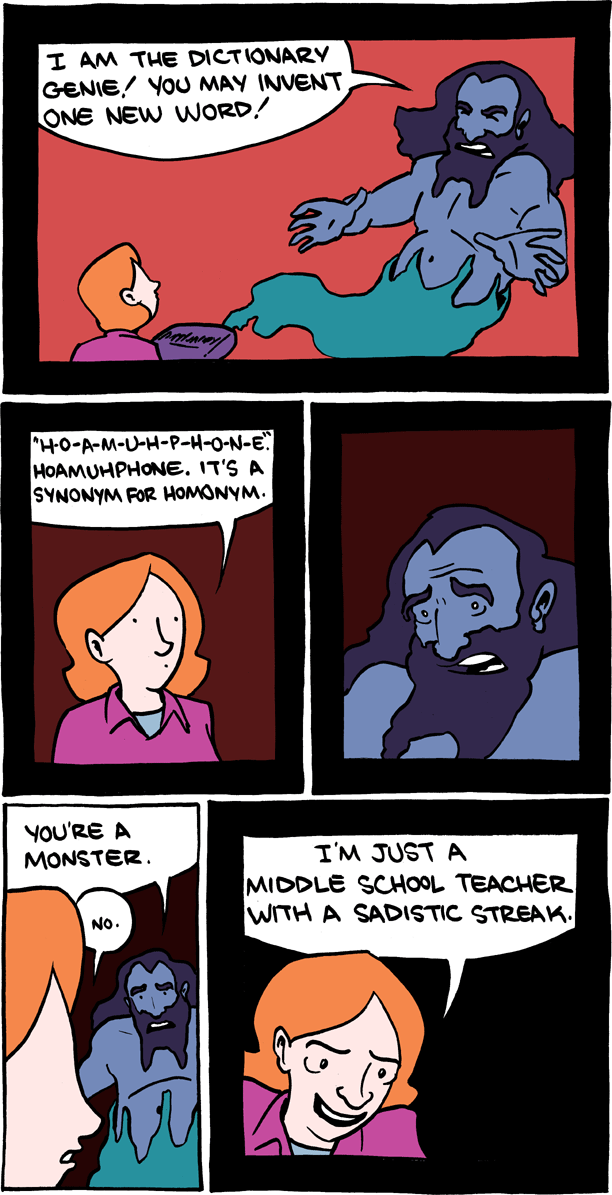(comic: Saturday Morning Breakfast Cereal)
Tag: grammar
Style Manuals Clash Over Titles
Whether in high school English class or on your blog, I’m sure you’ve run into this question: how do you indicate book titles? Are you supposed to underline them? Italicize? Put them in quotation marks? Make them sparkle?
The answer is…debatable. And you thought grammar was all about hard and fast rules. 😉
I tend to go with the Chicago Manual of Style on most grammar-related questions, so I italicize. But AP claims you should use quotation marks. So far I haven’t come across any style manual that suggests sparkles, but I’ll keep looking.
How do you denote titles?
It’s Just the Way I Write
I stumbled across this post by Mandy Hubbard about what authors have learned from their editors. My favorite is from Jennifer Brown, author of Hate List:
“On my last manuscript it was “just.” I spent an entire two-hour flight just deleting “justs.” Also, I learned from my copyeditor that Dumpster needs to be capitalized, and I’m pretty sure my copyeditor would jump up and down with glee if I learned the difference between “each other” and “one another.””
“Just” is my word too!! I’m so glad to hear someone else suffers from the “justs.” (At least two other authors on the list admit to being in the “just” club as well.) When I had my thesis defense for Queen of the Air, my thesis reader told me to go through and count how many justs were in the novel. Turns out there was at least one every page. I didn’t even notice it! Now I try to told back.
Make sure to click through for the whole list of editorial suggestions. It’s fun to see that even fantastic authors have their writerly ticks. What are yours?
Cheerfully Defending the Adverb
When I was in high school, someone gave me Stephen King’s On Writing. It’s supposed to be a great book. I’m sure that if I read it now, I’d really enjoy it. But I am a cold-hearted person and King’s comment that “the road to hell is paved with adverbs” inspired fury. “What does he know?!” I shouted.
It’s common advice: adverbs are the death of writing. Ten years later, I do use less adverbs in my writing, but I still think they hold an important place in literature. A well-used adverb can make a verb striking or exciting or unsettling. So when I read the title of Lily Rothman’s article “Why I Am Proudly, Strongly, and Happily in Favor of Adverbs,” I cheered a little.
Rothman describes how adverbs can drag down writing when they’re used lazily or improperly:
“Even if English speakers have a tendency to misuse adverbs, that doesn’t mean they’re evil. Some—those that help the current move “ceaselessly” at the end of The Great Gatsby or the crew of the starship Enterprise go “boldly”—are downright great.“
Just because people misuse something doesn’t mean it lacks a place in literature. And I love that reference to Gatsby. “Ceaselessly” makes the rest of the sentence shine in an unexpected way. It wouldn’t be a classic line without that adverb.
I tend to like “useless” parts of grammar more than other people. (Don’t bring up that Oxford comma debate!) But I’m glad to see that the adverb has at least one other defender.
